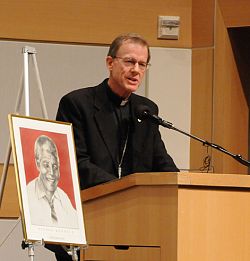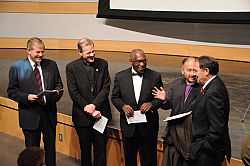Mandela 'showed us how to forgive,' Bishop Wester says at memorial service

SALT LAKE CITY — As funeral services for former South African President Nelson Mandela were underway in his home country, prominent Utahns gathered at the Salt Lake City Library on Dec. 15 to pay tribute to the man who spent 27 years in prison for his efforts against apartheid, but went on to win the Nobel Peace Prize jointly with his former political foe, South African President F.W. de Klerk. Mandela also was his country’s first democratically elected president, as well as the first black person to hold that office.
One of Mandela’s remarkable qualities was his ability to forgive those who had kept him behind bars, and who had subjected generations of his people to apartheid, a trait recalled by several of the speakers at the memorial service in Salt Lake City, which was organized by the NAACP Salt Lake Branch. The speakers, who represented Utah’s political, religious and social activism communities, all expressed their admiration for Mandela, particularly for his humility and skills as a statesman.
"This man lead people out of bondage," said Jeanetta Williams, president of the NAACP Salt Lake Branch. "He was a … man of courage."
Mandela "had a passion for forgiveness and did everything in his power to ensure that forgiveness was passed on to those who had mistreated so many," said Rev. France Davis, pastor of Calvary Baptist Church, who was among the event’s 14 speakers. "Mr. Mandela was a model of reconciliation, and I don’t know if I could do the kinds of things that Mr. Mandela did to bring people together."
Likewise, Gov. Gary R. Herbert called Mandela "a testament to the fact that … one individual can make a significant difference for good during their sojourn here on earth," adding that he appreciated the South African president’s commitment to the freedom of all people. He urged that those present join the effort "fought by Nelson Mandela to make the world a better place for all people regardless of the color of the skin, their ethnic origin or religion or their economic standing in life."
President Mandela’s leadership was of a kind rarely seen, said the Most Rev. John C. Wester, Bishop of Salt Lake City.
"I believe he gave us three distinct gifts: he showed us how to forgive, he showed us the effectiveness of selfless leadership and he taught us never to lose hope," Bishop Wester said. "Despite the notable lack of forgiveness in our world today, President Mandela engaged in reconciliation again and again and again. He did not repeat the cycle of violence but even after 27 years of incarceration decided, consciously, to forgive those who put him in prison. Even after the abuses of apartheid continued after his release he continued to forgive, forgiving even those who expressed no remorse. Nelson Mandela understood that only forgiveness would lead to true national reconciliation. Notably, he invited his white jailer to his inauguration as an honored guest. Nelson Mandela summed up his thinking this way: ‘As I walked out the door toward the gate that would lead to my freedom, I knew if I didn’t leave my bitterness and hatred behind, I’d still be in prison.’"
Mandela "lived forgiveness in a way that was at once selfless and filled with hope," Bishop Wester said. "In just a week or so we will celebrate Christmas and recall how three wise men came from the East bearing gifts for the newborn Christ child: three wise men, three gifts. Today we come here to honor one wise man who, nonetheless, is the bearer of three gifts. I pray that these gifts of forgiveness, selflessness and hope will take hold in our troubled and often violent world."
(The complete text of Bishop John C. Wester’s remarks, given at the Dec. 15 memorial service for Nelson Mandela at the Salt Lake City Library, follows.)
It was interesting for me to learn lately that the title "president" did not always carry with it the connotation of power and prestige, standing and stature. As a matter of fact, in our own country, our founders settled upon this title for the leader of the United States precisely because it denoted a humbler role that would not lead one toward visions of kings and emperors. Then, the word "president" denoted more of an overseer or one who presided over a meeting or an action. Only after many years did the term take on so much weight until the present time when the American president is arguably the most powerful person in the world.
With the death of President Nelson Mandela, the title of president is once again evolving, this time taking on a certain gravitas like never before. Interestingly, it is not that the office gave Nelson Mandela standing, although we can never overestimate that moment in history when a black man became the first president of South Africa, but rather it was Mr. Mandela who gave added weight to the office. What is more important, President Mandela gave the world the gift of leadership rarely seen in the history of humankind. To be more precise, and speaking from a pastor’s point of view, I believe he gave us three distinct gifts: he showed us how to forgive, he showed us the effectiveness of selfless leadership and he taught us never to lose hope.
Despite the notable lack of forgiveness in our world today, President Mandela engaged in reconciliation again and again and again. He did not repeat the cycle of violence but even after 27 years of incarceration decided, consciously, to forgive those who put him in prison. Even after the abuses of apartheid continued after his release he continued to forgive, forgiving even those who expressed no remorse. Nelson Mandela understood that only forgiveness would lead to true national reconciliation. Notably, he invited his white jailer to his inauguration as an honored guest. Nelson Mandela summed up his thinking this way: "As I walked out the door toward the gate that would lead to my freedom, I knew if I didn’t leave my bitterness and hatred behind, I’d still be in prison."
Second, in an age when our leaders appear to be more concerned about their own interests over and above those they serve, President Mandela made a habit of his selflessness. He knew that the injustices in South Africa were made by humans and therefore could be unmade by human beings as well. Perpetuating violence and injustice in the name of revenge would not bring peace and reconciliation in the post-apartheid era of South Africa. President Mandela’s leadership was never about power for himself, although few would fault him for being somewhat self-absorbed after his 27 year "holiday," as he put it. He never allowed the adulation he received to go to his head but his focus always remained on the good of the people whom he served.
Dov Seidman who wrote the book How, stated that "Mandela did big things by making himself small. Through his uncommon humility and his willingness to trust his people with the truth Mandela created a hopeful space where enough South Africans trusted each other enough so they could unite and do the hard work of transition together." As President Mandela himself said, "for to be free is not merely to cast off one’s chains but to live in a way that respects and enhances the freedom of others." New York Times columnist Thomas L. Friedman reflects this sentiment when he states that it was never about Mandela but rather about his people. It was about "seizing a really big moment to go from racism to pluralism without stopping for revenge." Mr. Friedman quotes Mr. Seidman, who expands on this and says that "Mandela did not make himself the hope … [but rather] saw his leadership challenge as inspiring hope in others, so they would do the hard work of reconciliation."
And that leads to what I would say is President Mandela’s third gift to us, namely, showing us how to hope. While Mandela could easily have succumbed to bitterness and become jaded, he instead embraced the theological virtue of hope. As he said himself, "I am fundamentally an optimist. Whether that comes from nature or nurture, I cannot say. Part of being optimistic is keeping one’s head pointed toward the sun, one’s feet moving forward. There were many dark moments when my faith in humanity was sorely tested, but I would not and could not give myself up to despair. That way leads to defeat and death."
I do not mean to canonize Nelson Mandela today. He would no doubt scoff at the idea, because he once said that "I am not a saint, unless you think of a saint as a sinner who keeps on trying." Nonetheless, he is a saint in many of our books because he lived forgiveness, in a way that was at once selfless and filled with hope.
In just a week or so we will celebrate Christmas and recall how three wise men came from the East bearing gifts for the newborn Christ child: three wise men, three gifts. Today we come here to honor one wise man who, nonetheless, is the bearer of three gifts. I pray that these gifts of forgiveness, selflessness and hope will take hold in our troubled and often violent world.
I was struck by a comment Dov Seidman once made regarding people’s attitude toward their leaders. He said, "People are rejecting leaders who rule by the formal authority of their position and command by hierarchical power. … They are craving genuine leadership – leaders who lead by their moral authority to inspire, to elevate others and to enlist us in the shared journey." President Nelson Mandela was just such a leader and that is why the title of president will never be the same again. May he rest in peace.
© Copyright 2024 The Diocese of Salt Lake City. All rights reserved.


Stay Connected With Us